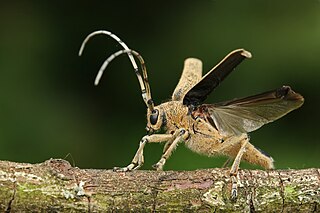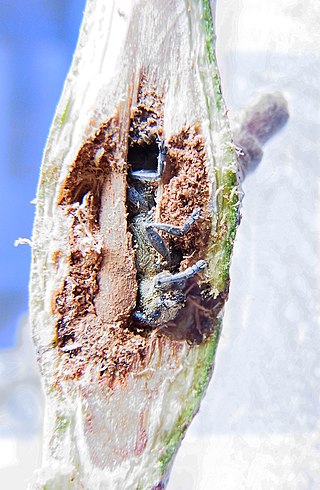
Chapman's swift is a species of bird in subfamily Apodinae of the swift family Apodidae. It is found in Bolivia, Brazil, Colombia, French Guiana, Guyana, Panama, Peru, Suriname, Trinidad, Venezuela, and possibly Ecuador.

Saperda carcharias is a species of longhorn beetle.

Saperda is a genus of flat-faced longhorn beetles belonging to the family Cerambycidae, subfamily Lamiinae. The genus was erected by Johan Christian Fabricius in 1775.

Saperdini is a tribe of longhorn beetles of the subfamily Lamiinae.
Paressisus is a monotypic beetle genus in the family Cerambycidae described by Per Olof Christopher Aurivillius in 1917. Its only species, Paressisus viridipennis, was described by the same author in the same year.

Saperda calcarata, the poplar borer, is a species of beetle in the family Cerambycidae. It was described by Thomas Say in 1824. It is known from Canada and the United States. It contains the varietas Saperda calcarata var. adspersa.

The Linden borer is a species of beetle in the family Cerambycidae. It was described by Thomas Say in 1824. It is known from Canada and the United States. It feeds on Tilia americana.

Saperda candida, the roundheaded appletree borer, is a species of beetle in the family Cerambycidae. It was described by Johan Christian Fabricius in 1787. It is known from Canada and the United States. It contains the varietas Saperda candida var. bipunctata.
Saperda fayi is a species of beetle in the family Cerambycidae. It was described by Bland in 1863. It is known from Canada and the United States.
Saperda horni is a species of beetle in the family Cerambycidae. It was described by Joutel in 1902. It is known from Canada and the United States. The species name is often misspelled as hornii.
Saperda interrupta is a species of beetle in the family Cerambycidae. It was described by Gebler in 1825. It is known from China, Russia, Siberia, Korea and Japan. It is associated with coniferous plantations, and infests species of fir, pine, spruce and other conifers.
Saperda lateralis is a species of beetle in the family Cerambycidae. It was described by Johan Christian Fabricius in 1775. It is known from Canada and the United States.

Saperda perforata is a species of beetle in the family Cerambycidae. It was described by Pallas in 1773, originally under the genus Cerambyx. It has a wide distribution in Europe. It feeds on Populus nigra, Populus alba, and Populus tremula. It is preyed upon by the parasitoid wasp Xorides indicatorius.

Saperda populnea, the small poplar borer, is a species of beetle in the family Cerambycidae which forms woody galls on twigs of poplars and willows. It was described by Carl Linnaeus in 1758.

Saperda quercus is a species of beetle in the family Cerambycidae. It was described by Charpentier in 1825. It is known from Turkey, Romania, Bosnia and Herzegovina, Jordan, Serbia, Bulgaria, Greece, Syria, and possibly Hungary. It feeds on Quercus coccifera.

Saperda scalaris is a species of beetle in the family Cerambycidae. It was described by Carl Linnaeus in 1758, originally under the genus Cerambyx. It has a wide distribution in Europe and Asia. It is preyed upon by parasitoid wasp species including Xorides praecatorius and Helcon angustator.

The elm borer is a species of beetle in the family Cerambycidae. It was described by Guillaume-Antoine Olivier in 1795. It is known from Canada and the United States. It feeds on Ulmus rubra and Ulmus americana. It acts as a vector for the fungus Ophiostoma ulmi, and as a host for the parasitoid wasp Cenocoelius saperdae.

Lebia viridipennis, the green-winged lebia, is a species of ground beetle in the family Carabidae. It is found in North America.
Phyllobrotica viridipennis is a species of skeletonizing leaf beetle in the family Chrysomelidae. It is found in North America.

Abisares viridipennis is a species of short-horned grasshopper in the family Acrididae, found in the Afrotropics.













